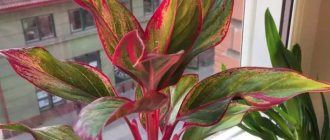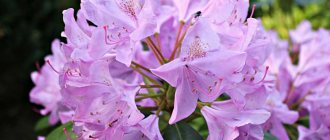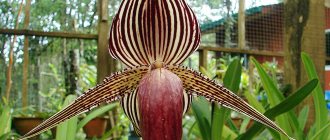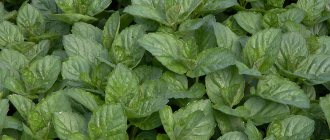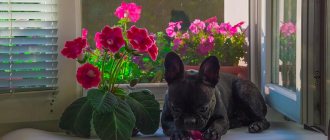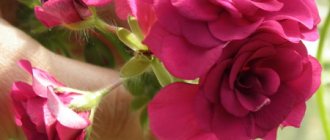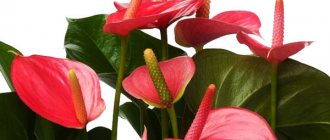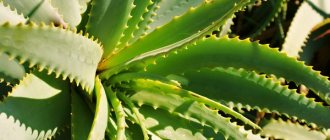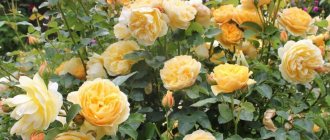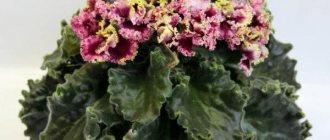Photo: diz-cafe.com Coleus is an ideal home flower, which combines amazing endurance with unusual beauty. It is valued not for its flowers, but for its original multi-colored leaves with patterns on the plates. If you don’t like wildly blooming flowerpots and all the tricks of caring for them, coleus will become your faithful friend and ally!
general information
The colloquial name for coleus, which it received for the expressive shape of its leaves, is weed. In the apartment the flower grows like an unpretentious perennial, but in the garden it will not survive the winter. And all because in nature it lives in Africa and Asia - regions with hot climates and no frost.
Coleus was brought to Europe on purpose and they immediately started breeding it. The first wild species amazed sailors so much that they brought them straight from the island of Java. So, since the nineteenth century, the popularity of the flower in the world has grown rapidly.
Photo: domashniecvety.ru
Coleus leaves can be the most unexpected colors: orange, red, burgundy. Most often, they combine several shades at once: for example, grassy green with purple. Together with the unusual shape of the plates, it looks very impressive and exotic!
Although it doesn't bother gardeners too much, coleus does have flowers. They are just small, faded and inconspicuous, whitish or blue. They are not particularly attractive, so it is better to remove the buds at the bud, otherwise they will draw almost all the nutrients onto themselves. Because of this, during flowering, the coleus leaves become smaller and fade.
Photo: flo.discus-club.ru
Effect on skeletal muscles
Muscle protein synthesis
Forskolin increases adenylate cyclase activity in skeletal muscle. It has been suggested that by increasing cAMP, forskolin increases muscle protein synthesis by activating PI3K and protein kinase B, independent of insulin receptors, a response dependent on desensitization.
Muscle contraction
Forskolin in vitro at a concentration of 1 μM increases electrical stimulation-induced muscle contraction in the diaphragm of mice. Theoretically, the mechanism for increasing cAMP levels is as follows: the activity of protein kinase A is induced, which affects the ryanodine receptor and increases the outflow of Ca2+ from the sarcoplasmic reticulum. Although biologically plausible, there have been no in vivo studies of the effects of Coleus forskohlii on muscle contraction.
Nutrients and muscle cells
In vivo studies have shown forskolin to reduce the effects of insulin on the mTOR/protein kinase B pathway in muscle tissue. In particular, forskolin reduces the ability of insulin to phosphorylate protein kinase B (without affecting its overall level), the same effect was noted on 4EBP1, while mTOR and S6K1 were not affected. Forskolin is also able to inhibit GLUT4 translocation in myocytes in vitro, as well as GLUT1 translocation, but to a lesser extent. This process is observed in adipocytes, since cAMP negatively affects the translocation of GLUT4 through its promoter, the same effect is present in muscle cells. Activation of cAMK/protein kinase A improves lipid metabolism and improves muscle cell activity and health. This may be due to a myokine called myonectin.
Coleus species
There are about one and a half hundred species of coleus, and almost all of them have decorative leaves. Beautifully flowering varieties are rare, but they are almost not common in our country. Two main species are grown in culture - Coleus Blume and Verschaffelta.
Coleus Blume
This is a perennial herbaceous species with oblong ovate leaves. Its plates are lowered and painted in all shades of green, pink, red and burgundy. A characteristic feature is textured tetrahedral stems. Popular varieties and hybrids are yellow-green Butterfly, luxurious scarlet Volcano, spectacular multi-colored Saber and delicate light green Golden Bedder.
Photo: vrn-agroservis.ru
Coleus Verschaffelta
In essence, Coleus Verschaffelt is almost no different from Blume. Except that it is larger, with large leaf plates and an expressive velvety surface. The most common color combination is the notorious duet of green and purple.
Photo: etsy.com
Hybrid coleus
Different varieties of hybrid coleus are very different from each other, but some features are preserved. They necessarily have oppositely growing leaves with an uneven edge: wavy, curly, jagged or dissected. The stems are always square in cross section and elongated, erect.
Photo: lph-zarechye.rf
Ampelous coleus
These are varieties with thin shoots that fall from hanging baskets and planters. The same coleus are excellent for landscaping fences on terraces and balconies. Among them there are very tiny hybrids up to 30 cm with multi-colored hanging leaves.
Photo: subscribe.ru
Succulents (85 photos): types, care features
Popularity of Forskolin
Forskolin can be compared to backup singers in the sports supplement arena. For many years now it has been in the shadow of tribulus, promoted by sports brands to intergalactic proportions. It is considered the main natural testosterone booster and it is this that gives manufacturers good profits. Forskolin is a different story: the supplement rarely appears in comprehensive testosterone boosters and has received little research. However, perhaps, this is where the disadvantages of forskolin end for now, because one of the latest studies has proven its obvious effectiveness in increasing testosterone and reducing fat mass. Moreover, the supplement works even for those who have never touched dumbbells.
Coleus care
Coleus is not only very beautiful, but also grows quickly at home. It is also useful because the leaves contain natural phytoncides that purify and refresh the air.
Temperature
Coleus loves warmth, so it feels best at a temperature of 20 degrees. It will not survive the winter in open ground, so it is grown in the garden as an annual. In an apartment, coleus feels good at a temperature of 16 degrees. Be sure to make sure that even in frost it does not fall below 12 degrees.
Photo: coleusy.ru
Lighting
For coleus to be truly bright and unusual, it needs as much light as possible. Varieties with white, yellow or red leaves tolerate even direct rays well, unlike green and purple ones. If you have south-facing or east-facing windows, choose them.
Photo: freyja.su
Watering
For watering, be sure to leave the water for at least a day in a warm place so that it is slightly warmer than the air temperature. In summer, make sure that only the top layer of soil dries out, and in winter, reduce the frequency. But do not allow the coma to dry out completely, otherwise the leaves will react almost instantly and become painful.
Coleus loves to be sprayed because it grows in hot, humid climates. Even in winter, it is better that the humidity in the room is slightly increased - for example, as in the kitchen or bathroom. For spraying, use the same warm, soft water as for irrigation.
Photo: foren.germany.ru
Soil and fertilizer
Coleus is absolutely unpretentious to the type of soil, so any nutrient mixture will do. At the beginning of the period of active growth, use mineral or organic supplements. Add a weakly concentrated solution once a week, and in winter - once a month and at half the concentration.
Photo: zen.yandex.by
Reproduction
Coleus propagates equally well by seeds and cuttings, because it grows quickly. At the end of winter, scatter the seeds evenly in a flat box and do not sprinkle on top. Go long distances because they have a very high germination rate.
Spray the soil with a spray bottle, set the temperature to 20 degrees and find a brighter place. The seedlings will germinate quickly, so don’t put off picking. If they no longer fit in the container, they may begin to wilt. To ensure that coleus bushes well from the first months, pinch it immediately after transferring it to a separate pot.
Coleus cuttings are replanted in spring and summer due to the fact that the flower is very heat-loving. To do this, the branches are cut off at the end of winter and transferred to nutritious flower soil. If you put them in water, hurry up and transplant the cuttings immediately after the roots appear.
Photo: domashniecvety.ru
Kalanchoe (60 photos): types and features of care
Landing
When growing coleus indoors, it must be planted in nutritious soil. Add sand to it for drainage. Or prepare the planting soil yourself from soil, peat, humus, or river sand. The mixture should have a neutral or slightly alkaline reaction. When planting seedlings in a permanent place on the street, adhere to the following dates: the third ten days of April, May and the first ten days of June. It all depends on the climatic conditions of the region.
Rules for planting seedlings:
- Decide on a landing site so that it is not in the lowlands.
- Prepare the soil. If the soil is dense, add sand to loosen it.
- Plant seedlings at a distance of 25-30 cm from each other.
- Introduce a “fungicide” into the planting hole so that the roots of the plant do not become infected with fungal diseases.
- When planting a plant from a pot, you need to transfer the seedling along with a lump of earth into the ground, thus protecting the roots of the plant. This planting of seedlings is called “transshipment”.
- After planting the seedlings, water them at the root and sprinkle the ground with a small layer of sand. If you plant a seedling grown from seeds in a pot, you should remember some rules:
- The pot for planting the seedling must be at least 15-17 cm in height and 10-12 cm in diameter so that the coleus roots have enough room to grow.
- Place pebbles or a special drainage mixture at the bottom for drainage.
The soil should have a neutral pH and be sand-drained. The most suitable soil composition:
- peat – 1 part;
- compost – 2 parts;
- sand - 1 part.
Place the seedlings in a pot 5-6 cm deep.
Pest and disease control
If the leaves of indoor coleus begin to suddenly lose color, most likely they are not getting enough sun. But there is also the opposite problem: unexpected white spots can turn out to be burns. This happens more often with young, vulnerable plants that are not yet accustomed to the daily routine.
Brown spots appear due to lack of moisture in the air, so do not forget about preventive spraying. Unexpected leaf fall is a sure indicator of nutritional deficiency. And if the flower begins to stretch too high, it needs preventive pinching and additional lighting.
Decorative coleus leaves are not very attractive to pests. But sometimes spider mites, whiteflies or aphids appear, so inspect the plants periodically. The affected flower must be urgently isolated from healthy ones and treated with insecticides.
Photo: greenhouse.cornell.edu
Dracaena (70 photos): types and features of care
Construction portal No. 1
FOR THE FIRST TIME I ORDERED PROCESSING DRUGS THAT ARE NOT IN RUSSIA. I AM VERY SURPRISED BY THE SPEED OF PLACEMENT OF ORDER AND RECEIPT. ALL PREPARATIONS HAVE INSTRUCTIONS. THERE ARE VERY FEW SUCH ONLINE STORES IN OUR TIMES. I RECOMMEND AND YOU WILL NOT BE DISAPPOINTED...
Excellent shop! The order arrived very quickly (it took 2 weeks to the Khabarovsk Territory, and only 300 rubles for shipping). In my practice, such time and price are the first. Everything is intact, perfectly packaged. The track was tracked. Managers are kind and always available. I will order and recommend.
Quickly, conscientiously, with detailed consultation—IT’S HERE!
This is the second time I order. The second time everything was great. Speed of delivery, packaging, respectful and attentive attitude!
I ordered fertilizer. Arrived very quickly, well packaged. All we have to do is wait for the results! But I think this is not in your competence! I'm happy with the store. I will order more!
Coleus – photo
It is simply impossible to go through all the varieties and shades of coleus at one time. But we did our best and prepared a photo selection to show you its versatility!
Photo: botanichka.ru
Photo: oir.mobi
Photo: trizio.ru
Photo: krsk.au.ru
Photo: setafi.com
Photo: shawnacoronado.com
Photo: rastenievod-007.blogspot.com
Photo: artfile.ru
Photo: sady-msk.ru
Photo: sytycd.ru
Photo: kashalot.com
Photo: domashniecvety.ru
Photo: botanichka.ru
Photo: saddrakona.ru
Photo: zen.yandex.ru
Photo: plantasonya.com.br
Photo: sady-msk.ru
Photo: telemetr.me
Photo: solo-semena.ru
Photo: plantorama.ru
Photo: greengarden34.ru
Photo: pinterest.ru
Photo: gardennews.ru
Photo: ecologia.chernbib.ru
Photo: pinterest.ru
Photo: greenlab-shop.ru
Did you like the post? Subscribe to our channel in Yandex.Zen, it really helps us in our development!
Effect on organs
Eyes
The study noted a decrease in intraocular pressure (IOP) in people who used eye drops containing forskolin (1% 50 µl solution), forskolin acted as an activator of adenylate cyclase. It has been suggested that the role of forskolin is to increase the rate of response of retinal ganglion cells (RGCs) to stimulation from NFM, since the NFM signal in these cells is transmitted through cAMP, but increasing the extracellular level of NFM effectively regenerates these cells and negatively regulates the TrkB receptor. The NFM signal in retinal cells BDNF acts as a growth factor and uses cAMP as a messenger in its signaling pathway. Since exposure to NFM and its mimetics reduces the expression of its receptor, reverse stimulation (via Forsklin) is thought to have similar effects without the risk of resistance. One study looked at the effects of forskolin in combination with other compounds. There was a 20% reduction in IOP with oral administration of spearmint (200 mg 10% forskolin), 200 mg rutin, and two B vitamins (thiamine and riboflavin, 550 mcg and 700 mcg, respectively) for 40 days in individuals with primary open-angle glaucoma (POAG). ), other studies using these drugs have replicated the results of the study described. Efficacy increases when used in addition to standard therapy, and use for more than one month reduces IOP by an average of 10%. When taken orally as a supplement for over 40 days, forskolin effectively lowers intraocular pressure. Further studies using forskolin without other substances are needed; longer use of the drug will help assess the risk of resistance.
Liver
Taking Coleus forskohlii extract (5% of the diet) induces the activity of various liver enzymes and also increases liver weight. There was a dose-dependent increase in the transcription of Cyp2b10, Cyp2c29, Cyp3a11 and Gstm2. Changes are observed after one week of use and stop after stopping taking Coleus. The approximate dosage is 740 mg per kg body per day, for a total of 24 mg for rats. Induction of CYP2C activity is clinically important as it is the enzyme that metabolizes warfarin. Isolated forskolin induces the activity of CYP3A and glutathione enzymes less strongly and does not increase liver weight when used at 0.05% of the diet. Induction may be mediated by a pregnane X receptor agonist, which is independent of the effect on adenylate cyclase.
Side effect
Forskolin causes minimal harm to health. In many scientific studies, scientists have used equine doses of forskolin in animal testing, but no significant harm was found. However, taking into account the scheme of action of the substance on the body, there are several limitations:
- Since Coleus forskohlii lowers blood pressure, it is better not to use it for people with hypotension.
- Some research suggests that forskolin may increase stomach acidity. Therefore, people with ulcers or gastritis should avoid forskolin.
- In isolated cases, forskolin can change color perception. The effect goes away after discontinuation of the drug.
Where can I buy?
There is a system of discounts and bonuses for buyers. If you order not 1 package of product, but 2, then in most cases you can save money. Statistics show that on iHerb the cost of products is 30 - 40% lower than from other suppliers or pharmacies. In addition, the risk of encountering a low-quality drug is practically eliminated, since the products are supplied directly from the manufacturers.
BioSchwartz, Maximum Strength, Forskolin Weight Loss, 500 mg
The dietary supplement is made from high-quality raw materials and meets all international standards. The composition includes a standardized plant root extract in a volume of 500 mg per serving, which is 2 capsules.
This is a pure concentrate that does not contain any other fillers or binders. Only vegetable cellulose is used to produce the vegetarian casing.
The drug is available in capsule form. For preventive purposes, the manufacturer recommends taking 2 pieces per day. For best results, take the capsules half an hour before meals and drink a glass of water.
You cannot change the dose indicated in the instructions yourself. The duration of the course of treatment should be determined by the doctor. Since one package contains 60 capsules, the jar is enough for 1 month of daily use.
Useful properties of the plant
Some of the types of coleus not only decorate the space, but also provide benefits. In particular, Coleus Forskolii is used in the manufacture of medications and dietary supplements due to the forskolin in its composition.
It activates and normalizes metabolism, helps vitamins and various beneficial substances be better absorbed. Thanks to this, the body begins to burn fat deposits faster, improving the appearance and condition of the body.
You cannot prepare potions from homemade coleus yourself. Leave it to the professionals and buy medicinal preparations with coleus extract in pharmacies!
Description
Coleus is a small shrub (up to a meter high) with well-branched shoots. Its stems have a geometric shape of a trihedron or tetrahedron. At the base the bark becomes woody, and at the top it remains green.
The oval-heart-shaped leaves grow in pairs. Their apex is pointed, with symmetrical teeth along the edges. Finely villous pubescence is barely visible on the surface, for example, in the Coleus Faust variety. Their color is variegated in shades of red and green (depending on the variety).
A description of coleus will remain incomplete without mentioning its flowering: small buds are colored blue or pink and are collected at the top of the trunk into an inflorescence-spike.
Popularly, due to the external resemblance of the leaves and trunks to nettles, the flower received the nickname “coleus-nettle”. The size of the plant, depending on the variety, can be from 30 to 100 cm in height, and the crown is easily formed by pruning.
